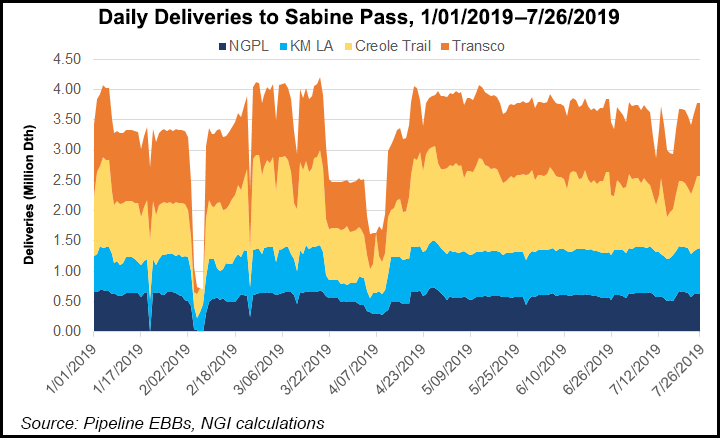Infrastructure | LNG | NGI All News Access | NGI The Weekly Gas Market Report | Regulatory
NGPL Seeks Swift FERC Action to Expand Sabine Pass LNG Service
The owners of a major natural gas pipeline traversing the Gulf Coast are urging federal regulators to approve a plan to use unsubscribed capacity and a new compressor station to provide nearly 0.5 Bcf/d of additional firm transportation service to accommodate liquefied natural gas (LNG) exports.

In a letter to FERC sent last Wednesday, Natural Gas Pipeline Co. of America (NGPL) and Sabine Pass Liquefaction LLC (SPL) requested a certificate of public convenience and necessity for the proposed Sabine Pass Compression Project (SPCP). In its application, filed in May 2018, NGPL said the 400,000 Dth/d of capacity would service SPL’s export terminal in Cameron Parish, LA, as well as provide increased operational flexibility on the pipeline.
NGPL and SPL asked the Federal Energy Regulatory Commission to issue the certificate by next Friday (Aug. 2) to allow construction to begin by September, “which is necessary to minimize construction overlaps in the vicinity of SPL’s ongoing Train 6 construction (scheduled to significantly ramp up in early 2020.)”
Sanctioning for the sixth production unit at Sabine Pass has not been announced, however, developer Cheniere Energy Inc. last fall signed an engineering, procurement and construction (EPC) contract with Bechtel Oil, Gas and Chemicals Inc. Bechtel has served as the EPC contractor for all of Cheniere’s LNG production units.
FERC issued an environmental assessment in March, with a finding that approval, with mitigating measures, would not significantly affect the environment. In June, SPL filed a letter to reiterate its support for the project and expectations for a timely Commission order approving the project.
Given SPCP’s pending status for more than a year, NGPL and SPL indicated that any further delay in issuing a certificate could interfere with completing construction in a timely manner.
“SPL needs the project to be constructed and placed in service at the earliest date possible in order to commence receiving the additional firm transportation service for its feedstock gas to the SPL terminal, and critically prior to cooler winter weather in 2020 (when LNG demand generally increases globally),” NGPL said.
© 2024 Natural Gas Intelligence. All rights reserved.
ISSN © 1532-1231 | ISSN © 2577-9877 | ISSN © 1532-1266 |
